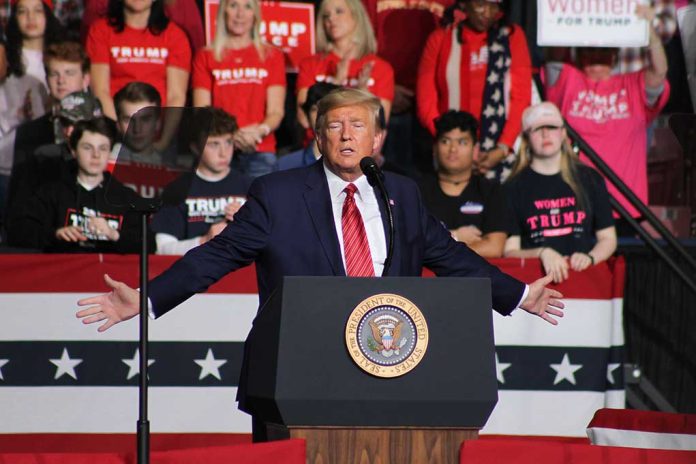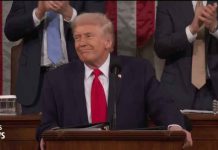
President Trump strikes a strategic balance with Venezuela by allowing Chevron to maintain its $7 billion in assets while firmly blocking oil imports from Maduro’s corrupt regime.
Key Takeaways
- Trump’s administration crafted a narrowly tailored sanctions waiver for Chevron to protect its $7 billion in Venezuelan assets while maintaining import restrictions
- The US implemented a 25% tariff on countries that purchase Venezuelan oil, targeting India, China, Spain, and Italy
- Special Envoy Ric Grenell has been involved in complex negotiations regarding Chevron’s operations in Venezuela
- The Trump administration is cutting financial lifelines to Maduro’s regime, which has been stealing elections and persecuting political opponents
- This policy represents a shift from the previous administration’s more lenient approach toward Venezuelan oil imports
Trump’s Strategic Approach to Venezuelan Oil
President Trump has implemented a comprehensive strategy to isolate Nicolas Maduro’s Venezuelan regime while protecting American business interests. The administration is allowing Chevron to maintain its substantial infrastructure in Venezuela, valued at approximately $7 billion, while simultaneously upholding a strict ban on importing Venezuelan oil. This carefully calibrated approach enables the energy giant to perform essential maintenance and protect American investments while ensuring no financial benefits flow to Maduro’s corrupt government. Trump’s policy represents a significant shift from the previous administration’s more permissive stance on Venezuelan oil imports.
“It will be renegotiated so that Chevron equipment can remain, but no (money) for Maduro, which was the issue,” stated a senior White House official.
The limited sanctions waiver for Chevron permits only basic maintenance operations rather than energy exploration or production activities. This policy ensures that American assets remain operational and protected from potential seizure by the Maduro regime, while maintaining maximum pressure on Venezuela’s socialist government. Special Envoy to Venezuela Ric Grenell has been actively involved in negotiating these complex arrangements, reportedly working to secure both the protection of Chevron’s assets and the release of American detainees.
Tariffs as an Economic Weapon Against Maduro’s Allies
In a bold escalation of pressure on Maduro’s foreign supporters, President Trump announced a 25% tariff on oil and gas imports from countries that purchase Venezuelan crude, effective April 2. This measure specifically targets nations like India, China, Spain, and Italy that have continued to provide financial lifelines to Venezuela despite international condemnation of Maduro’s undemocratic practices. The president cited Venezuela’s hostility toward the United States as a primary motivation for these aggressive economic measures, which align with his broader strategy of using tariffs as leverage in international relations.
“very hostile to the United States,” said President Donald Trump, when describing Venezuela’s actions.
The tariffs will remain in place until a country ceases importing Venezuelan oil for at least one year, although the administration reserves the right to revoke them earlier. This policy creates significant economic incentives for nations to reconsider their trade relationships with Venezuela, potentially isolating Maduro further. For countries like India, the tariffs could substantially increase procurement costs and disrupt existing supply chains, forcing refiners to seek alternative sources such as Russian oil to offset these additional expenses.
Standing Firm Against Maduro’s Abuses
The Trump administration’s stance toward Venezuela has hardened in response to Maduro’s increasingly authoritarian actions. Following the announcement of Chevron’s license expiration, Maduro’s regime arrested numerous political opponents and staged elections that were widely boycotted by opposition parties. The Venezuelan electoral council subsequently claimed a suspicious landslide victory for Maduro’s party, further undermining any pretense of democratic governance. These actions have only strengthened the administration’s resolve to maintain economic pressure on the regime.
“This termination executes on the President’s directive and cuts off financial lifelines for a regime that has consistently stolen elections, pillaged from its people, and colluded with our enemies,” according to the State Department.
President Trump has made it clear that his administration will not follow his predecessor’s failed approach of economic appeasement toward Venezuela. Instead of allowing Maduro to profit from American companies’ operations, Trump has revoked licenses for US-based businesses in Venezuela while implementing targeted exemptions to protect American investments. This balanced strategy demonstrates the administration’s commitment to defending both American economic interests and democratic values in Latin America, while refusing to financially empower a corrupt socialist dictatorship that continues to oppress its people and undermine regional stability.


